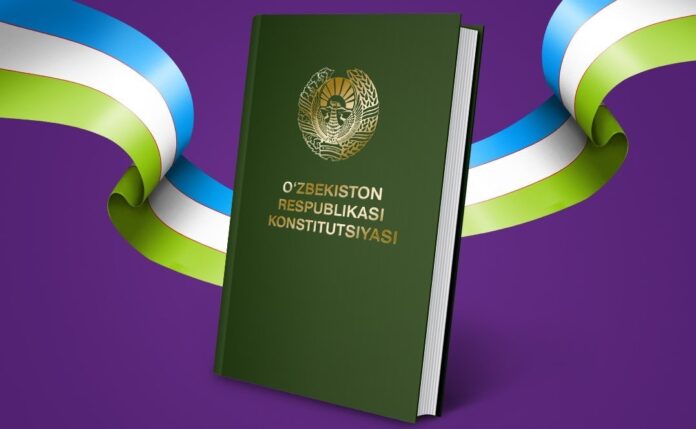The main content of the suggested amendments and additions to the Constitution of the Republic of Uzbekistan in the new edition and the new version of the legislation is significant in that it is aimed directly at solving existing social problems that affect people in our society.
Specifically, the preface to the Constitution states that “we, the only people of Uzbekistan,… demonstrating our commitment to the ideas of social justice and solidarity, we accept and declare this Constitution.” The term “social justice“ is mentioned in Articles 14 and 19 of the new version of the Constitution. Article 14, in particular, introduces norms that “the state shall conduct its actions on the principles of legality, social justice, and solidarity in order to ensure the well-being of people and the sustainable development of society,“ and Article 19 states that “benefits shall be determined only in accordance with the law and shall conform to the principles of social justice.
At this point, let us elaborate on what “social justice“ is and why it is specifically addressed in the Constitution. As there is a state and society in real life in general, there are a number of interrelations arising between them, in particular, the question of social justice as one of the most important issues. Thus, with the current context of globalization, the problems of social justice in society are more relevant than ever, and addressing this issue is becoming a high priority for every state.
While in the earlier days, only philosophers, political scientists, or lawyers were concerned with ensuring social justice in society and related issues, today it has become a necessity of the times that economists should also be accountable for this question. Because the development of the market economy, in turn, increases the social stratification among the population. This leads to the emergence of a rich class and a poor class in society, and inequality between them grows. As a result, a segment of the population in need of social protection emerges in the country. In such a situation, the government takes it upon itself directly to ensure the principles of social justice in society. The recognition in the preface to the Constitution of a commitment to social justice is certainly considered important not only for the current but for the medium and long term.
Currently, there are great efforts being made around the world to put the principles of social justice into practice. In this regard, the United Nations (UN) General Assembly decided in 2007 to recognize February 20 each year as the World Day of Social Justice around the world, starting in 2009. The main objective of the UN in undertaking these measures is to draw global attention to the need to promote social justice through efforts to jointly address such critical issues as poverty, gender inequality, unemployment, failure to respect human rights, and social exclusion across all countries. For this reason, these requirements are placed in the relevant articles of our Common Law in order to legally enshrine the changes that are being made in our country with regard to social justice at the international level. Based on this, the primary objective is seen not merely as a moral requirement of the concept of social justice in our country but as an essential factor leading to national stability and assuring global prosperity.
In recent years, a number of structural improvements have been made to the system of social welfare. In particular, over the past five or six years, for a variety of factors, specific economic mechanisms have begun to work in the social protection system for our vulnerable, low-income, and unemployed citizens. These mechanisms ensured, first of all, comprehensive support to those who are economically and socially disadvantaged as a result of temporary unemployment that emerged in the low-income stratum after the pandemic, providing support not only financially to unemployed women but also providing direct assistance in finding new jobs, upgrading their professional skills. Proceeding from these objectives, Article 43 of the proposed new Constitution states that “the state will take measures to ensure employment of citizens, protect. Additionally, the following norm is introduced: “The state will take measures to ensure the employment of citizens, to protect them from unemployment, and to reduce poverty.” The implementation of this norm is intended to increase the real earnings of the population, as well as to solve a number of social issues that have been plaguing our population for a number of years, in particular, unemployment, job placement, poverty reduction, and the creation of new jobs.
Prior to 2016, poverty in our country remained officially unrecognized. This made it practically impossible to take practical measures to alleviate poverty in our country. Over recent years, as a result of the attention paid to social protection in our country, our government has officially recognized that there is a poverty stratum in our country, and there have been efforts to reduce it. However, as a result of economic reforms in poverty reduction, and unemployment, there are some shortcomings in our laws concerning the social protection of low-income citizens, which is reflected in practice.
At the same time, amendments to the Constitution in order to develop the well-being of the households, promote entrepreneurship, secure the employment of citizens, and organize training and retraining opportunities for their professional development in order to raise the standard of living and income in our country are aimed directly at prioritizing social protection by the government and guaranteeing the state:
first, developing an open and transparent mechanism to protect socially vulnerable, low-income, disadvantaged citizens from unemployment;
second, to support families in poverty, to digitalize the process of employment of the population in need of social assistance, and to develop an e-platform for this purpose;
thirdly, to improve the professional skills of that fraction of the population that needs assistance in employment, to guarantee by law a system of retraining according to the request of employers;
fourth, providing a legal framework for the creation of short-term training courses in order to create secure jobs for the impoverished segment of the population, as well as for single women.
In conclusion, the norms proposed for inclusion in articles 1,14,43,47,57 and 76 of the draft of the new version of the Constitution provide opportunities to address the aforementioned social issues in our country, solve the problems of unemployment in our societies, and strengthen social protection of vulnerable citizens.
About Author:Nodirbek Rasulov, Doctor of Science (DSc), Associate ProfessorProject Manager Institute for Macroeconomic and Regional Studies






